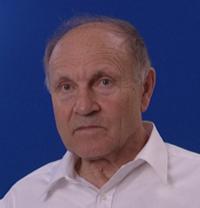Don’t trust those people, because if you admit just one thing, whatever it is, they will force you to reveal much more
Ladislav Kisska was born on March 21, 1929 in Dolné Motešice (Trenčín district). He attended the public elementary school in his home village and later moved to the grammar school in Trenčín, where he also passed the school leaving examination in 1948. Then he left for Košice to study forestry engineering; however, in January 1949 he was arrested by the State Security (ŠtB). He experienced a really cruel investigation, after which he and another 62 accused and 48 sentenced people were charged with the offences of high treason and espionage in the case of Albert Púčik and Co. Albert Púčik and Anton Tunega came from Dolné Motešice as well and they got to know each other a bit better when they all were studying at the grammar school in Trenčín. Púčik, Tunega and Tesár were executed on February 20, 1951 in Bratislava. Everybody who got in touch with these men was investigated by the State Security and prosecuted. Ladislav lent some money to Púčik as he needed it to finish his medical studies in Vienna because he wasn‘t allowed to study in Slovakia. He also delivered an article to Tunega, in which he brought a sort of optimistic and positive description of how students worked at the railway line called Trať mládeže (Line of Youth). Though it wasn‘t Ladislav‘s intention to „harm his homeland“, his deeds didn‘t remain unpunished. When he was in a remand centre, he managed to get in touch with Púčik and Tunega, and achieved an agreement on the testimonies of the accused at court, so Ladislav could be released from prison. He left for Košice where he intended to continue in the study of forestry engineering; however, he didn‘t stay at liberty for long. About two months later, he was arrested again and for the reason of so-called socialist re-education he was interned in the forced labour camp in Ilava. A bit later he was moved to Hronec, from where he managed to escape along with other three prisoners, one Czech and two Hungarians. They ran through the forests to Banská Bystrica and thence they travelled to Prague. His former Czech cellmate was expected to arrange permission to leave for the border area in order to cross the Iron Curtain. However, one day his Czech „friend“ disappeared and Ladislav has never seen him again. After this unsuccessful attempted escape from the country, he moved to Slovakia and spent some time in hiding in the forests. Thanks to his father‘s contacts, Ladislav managed to cross the Czech-German border and then he got to the German refugee camp, where he applied for the US immigration visa. However, the United States granted visas for Czechoslovaks only after five years, therefore he decided to leave for Canada where his uncle lived at that time. In 1955 he finally got the U.S. immigration visa and left for California, where he completed the forestry studies. At last he moved to the state of Idaho, got an American citizenship and worked as a forest worker for the state authorities. He returned to Slovakia only after the Velvet Revolution.

